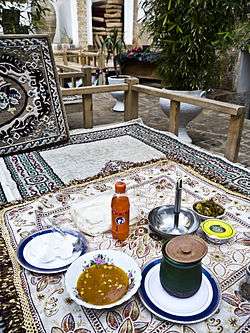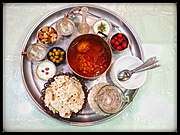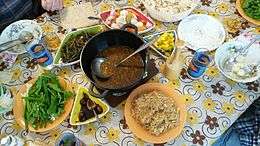Abgoosht
Abgoosht (Persian: آبگوشت Âbgušt, pronounced [ɒːbˈɡuːʃt]; literally "meat juice") is an Iranian stew. It is also called dizi (Persian: دیزی, pronounced [diːˈziː]), which refers to the traditional stoneware crocks it is served in. Some describe it as a "hearty mutton Persian soup thickened with chickpeas."[1]
 Abgoosht in dizi pots | |
| Alternative names | Dizi |
|---|---|
| Place of origin | |
| Main ingredients | lamb, chickpeas, white beans, onion, potatoes, and tomatoes, turmeric, and dried lime |
| 400 kcal (1675 kJ) | |


Preparation
Ābgoosht is usually made with lamb, chickpeas, white beans, onion, potatoes, tomatoes, turmeric, and dried lime. Other variations exist in the beans used, such as kidney beans and black-eyed peas.[2] The ingredients are combined together and cooked until done, at which point the dish is strained. The solids are mashed as gusht kubideh (Persian: گوشت کوبیده, literally "mashed meat") and served with the broth, but in a separate dish, along with flatbread. It is a form of Piti, which encompasses many similar dishes in the region.
Variations
Assyrian abgoosht
Assyrians of northwestern Iran, particularly surrounding Urmia, traditionally make abgoosht using beef, lime, kidney beans, and chickpeas, which is served in a lime broth with potatoes and eaten with onions and lavasha (an Assyrian bread) on the side. Assyrians typically make abgoosht in the winter. The regional pronunciation is "abgoosh", without the 't' (ܐܒܓܘܫ).
Armenian abgoosht
A similar dish in Armenia is also called abgoosht. The difference is that in Armenia beef rather than lamb is used.[3]
 Abgoosht with various side dishes in Armenia
Abgoosht with various side dishes in Armenia
Piti (Caucasus and Central Asia)
Piti (or putuk) is a variation of abgoosht in the cuisines of the Caucasus and Central Asia.
See also
References
- Rajendra, Vijeya; Kaplan, Gisela T.; Rajendra, Rudi (1 May 2003). Iran. Marshall Cavendish. p. 127. ISBN 978-0-7614-1665-4. Retrieved 27 August 2012.
- Shirin Simmons (15 October 2007). Treasury of Persian Cuisine. Stamford House Publishing. pp. 67–69. ISBN 978-1-904985-56-3. Retrieved 27 April 2010.
- "Abgoosht: One of the Most Traditional Foods of Iran". Retrieved 20 December 2014.